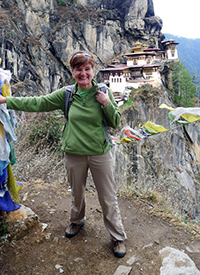FIMS News
Contact Information
FIMS Communications
Becky Blue
Email
519-661-2111x88493
FIMS & Nursing Building
Rm 2060C
Revisiting social injustices through a historical lens
 The events that Kate Johnson’s research focuses on may have taken place over a half-century ago, but they’re still just as relevant today.
The events that Kate Johnson’s research focuses on may have taken place over a half-century ago, but they’re still just as relevant today.The Library and Information Science professor finds similarities between the RCMP’s anti-communist campaign to purge homosexuals from the civil service in the 1950s and today’s widespread culture of Islamophobia.
“It’s kind of a parallel to what’s currently going on with the anti-Muslim sentiment,” she says. “Anyone who is a Muslim is a terrorist. Anyone who is gay is a spy. These are things that don’t necessarily correlate.”
The former librarian is interested in how access to information laws have impacted historical research in past decades. Johnson has a specific focus on researchers from the 1980s.
“The access to information act was established in Canada in 1983 and I'm looking at how it impacted a couple of historians’ research at the time,” she said. “They were writing books on the 1950s, and I’m looking at the same period in history to see if my access has changed from what they were able to access.”
The FIMS professor is currently using access to information requests to obtain government documents from the 1950s, just like the historians did.
This era was marked by an intense fear of communism. The anxiety grew during the Cold War period, as the Soviet Union became stronger.
“It was an interesting period. The fear was that the Soviets were sending all these spies over to Canada and the US or that they were influencing people in important positions to share government secrets.”
Beginning in the 1950s, the RCMP amassed a huge database of people who may have been communists or were selling secrets to the communists. If someone belonged to a communist party, was a communist in their youth or was homosexual, they were on the RCMP’s radar.
She says the RCMP tarred everyone with the same brush. Everyone who was gay was in danger of being blackmailed, especially if they held high-ranking positions.
“Homosexuality was considered a character weakness, so if someone from the other side suspected you to be gay, they could set you up in compromising situations. They’d photograph you and then blackmail you with that information.”
The historians in the 1980s studied a gay Canadian ambassador to the Soviet Union who experienced just that — he was put in a compromising situation and later blackmailed. Although Johnson is looking at a different ambassador to the Soviet Union, she’s curious in seeing how her information seeking process compares to the historians’.
Another angle that Johnson is exploring is how access to information affects social justice. The access to information act can be used to correct injustices — such as the RCMP’s campaign against homosexuals — by exposing what kinds of investigations were going on and who was targeted.
“Uncovering those campaigns led by the police and other officials would serve to make us aware of what happened.”
Johnson says the RCMP’s campaign was a “terrible injustice.” Some civil servants lost their careers, while others committed suicide because they couldn’t cope with being under suspicion.
As far as Johnson is concerned, her research interests won’t be changing anytime soon. Historical research is a much slower process than the social science research she’s done in the past so she expects it will take longer to collect the data to get a clear picture of that era.
When she first started teaching at Western in 2007, Johnson looked at how libraries build a greater sense of engagement with the community. That area of interest developed from her time spent volunteering with the UN in Mongolia where she worked at the Press Institute of Mongolia, during a period of political transition after the dissolution of the USSR in 1991.
“The experience certainly gave me another perspective on the world,” Johnson said. “Going to a developing country and seeing their resilience and what they had to deal with after the collapse of the Soviet Union was really eye-opening.”
Her work abroad inspired her to go back to school for a PhD in Library and Information Science. While completing her dissertation, Johnson researched the influence of social capital on Mongolian information seekers.
Conducting research on topics she’s passionate about will always be one of the most rewarding aspects of Johnson’s job.
“There’s a great freedom of expression and intellectual freedom at a university of this level. I love it,” she says. “With my kind of historical research, I like finding little pieces of the puzzle. You can go through vast amounts of data and then you get that one little nugget that suddenly brightens up the whole area that once was dark.”


